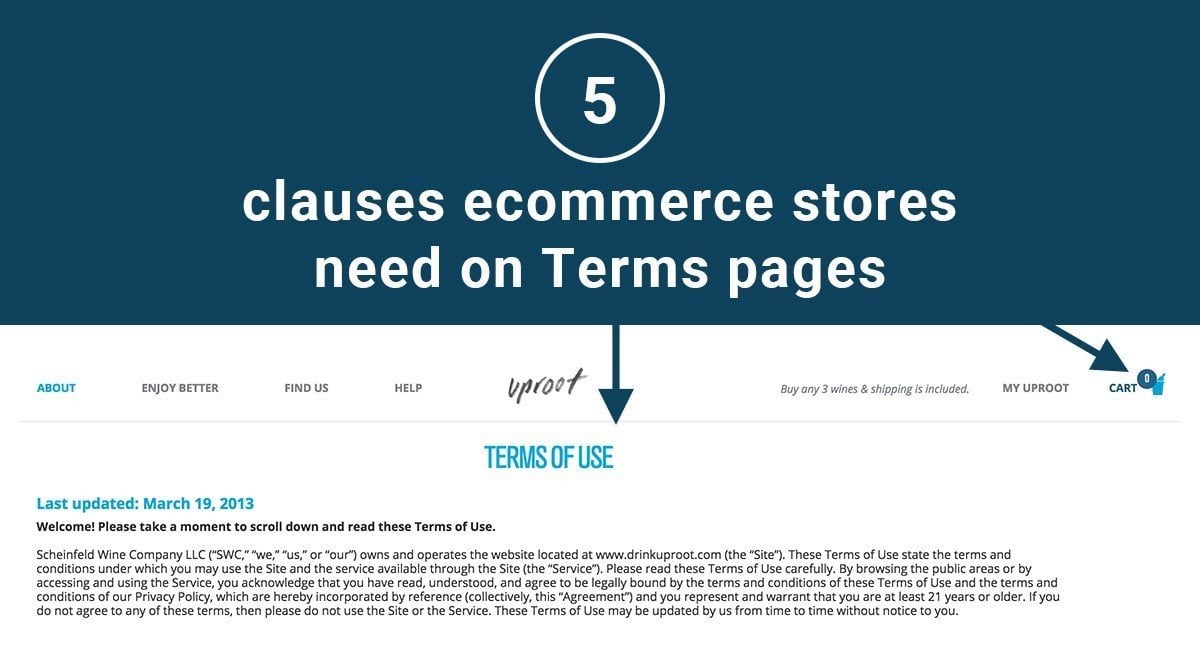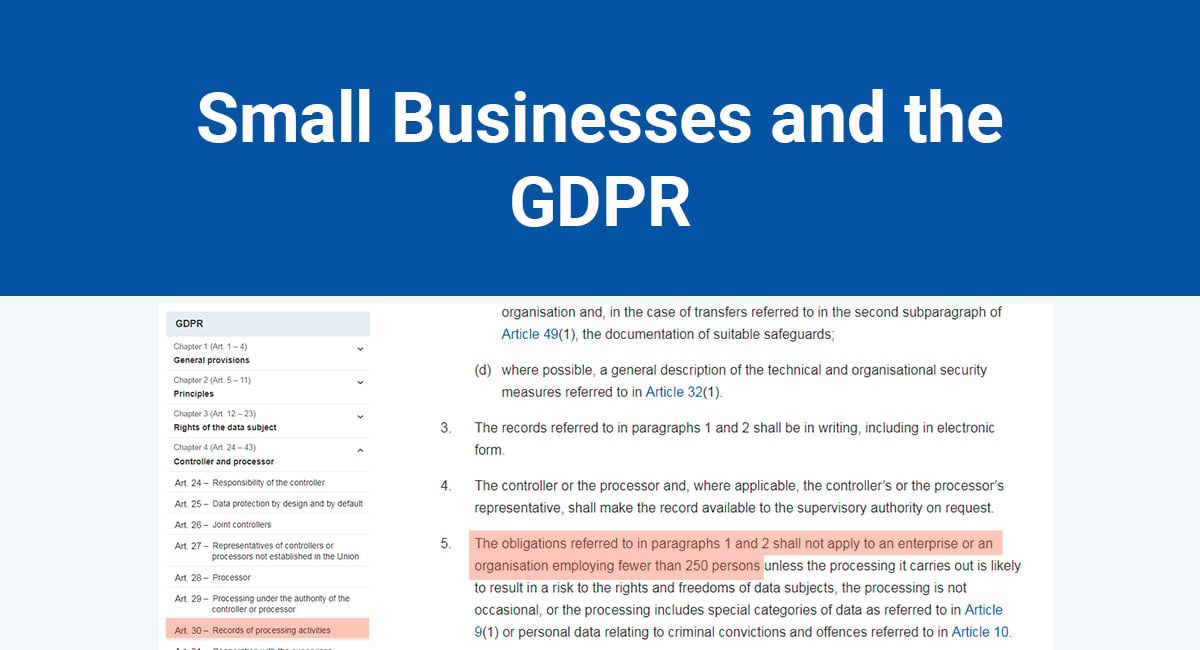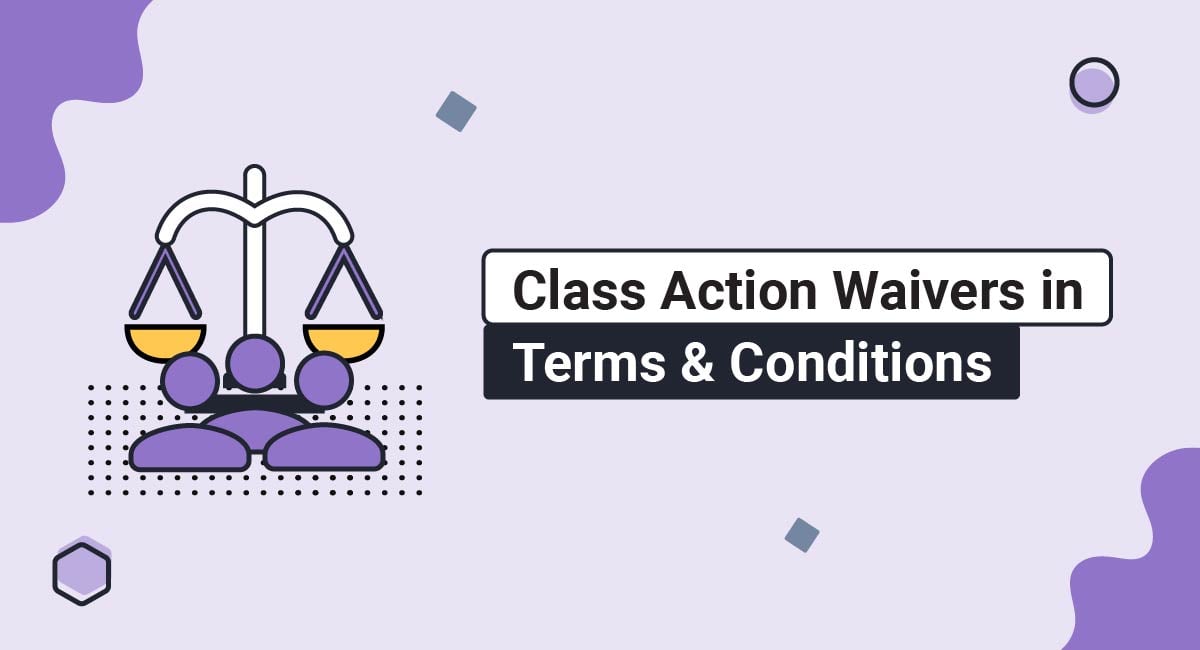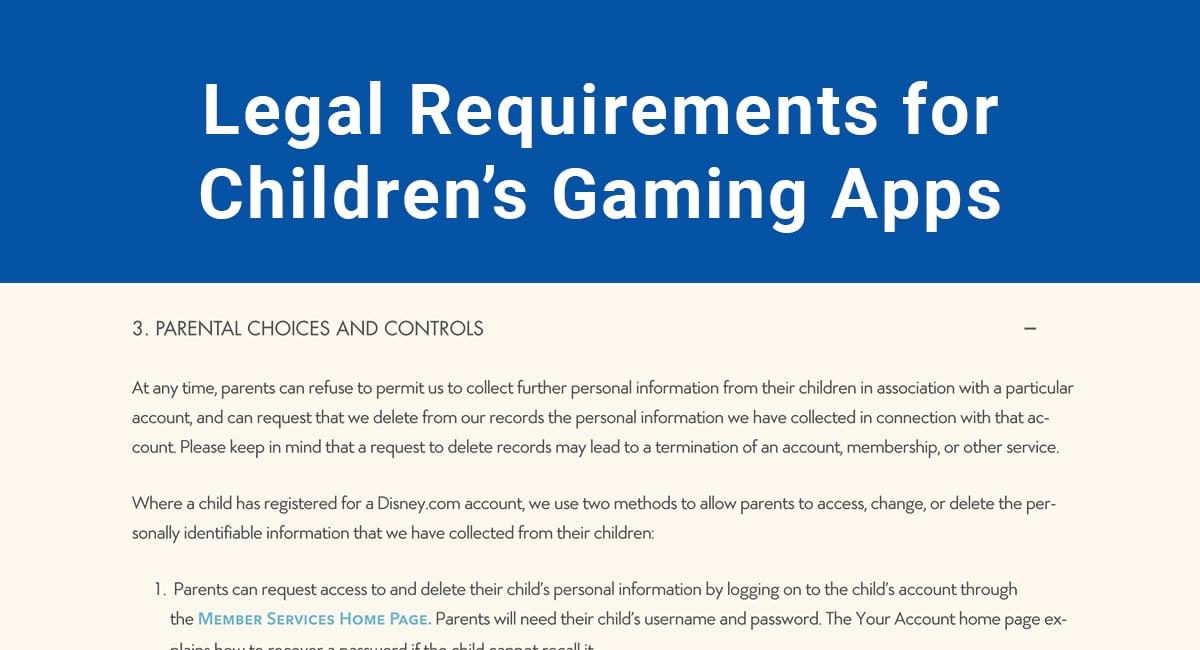Terms and Conditions for e-commerce stores (also known as Terms of Use or Terms of Service) are regularly used to cover off a wide range of issues, but it's crucial to make sure you cover the clauses you add in that agreement that will protect your business.
To do this, here are 5 key clauses you can add: customer rights and responsibilities; intellectual property; payment details; exclusion and limitation of liability; and amendment clause.
Let's take a look at each of these in turn, and see why they are so important for your e-commerce store.
Our Terms and Conditions Generator makes it easy to create a Terms and Conditions agreement for your business. Just follow these steps:
-
At Step 1, select the Website option or the App option or both.
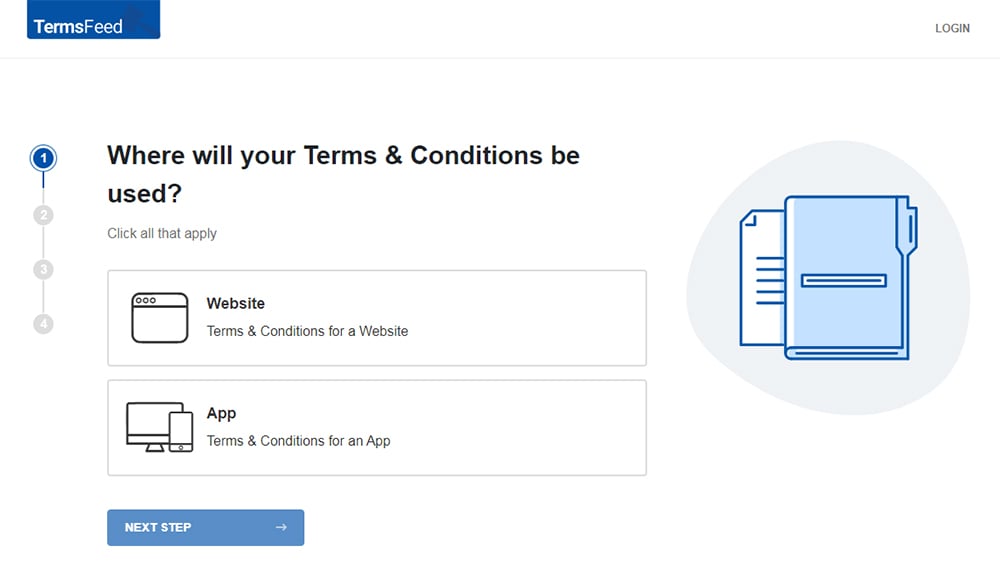
-
Answer some questions about your website or app.
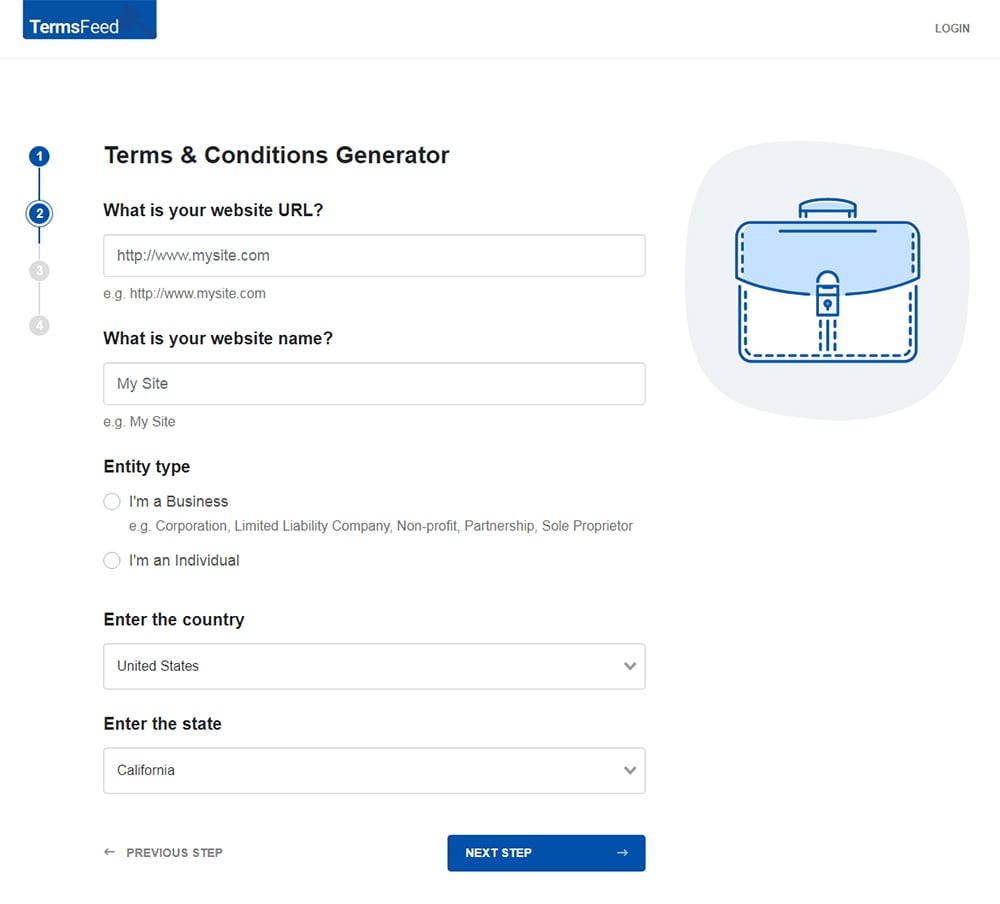
-
Answer some questions about your business.
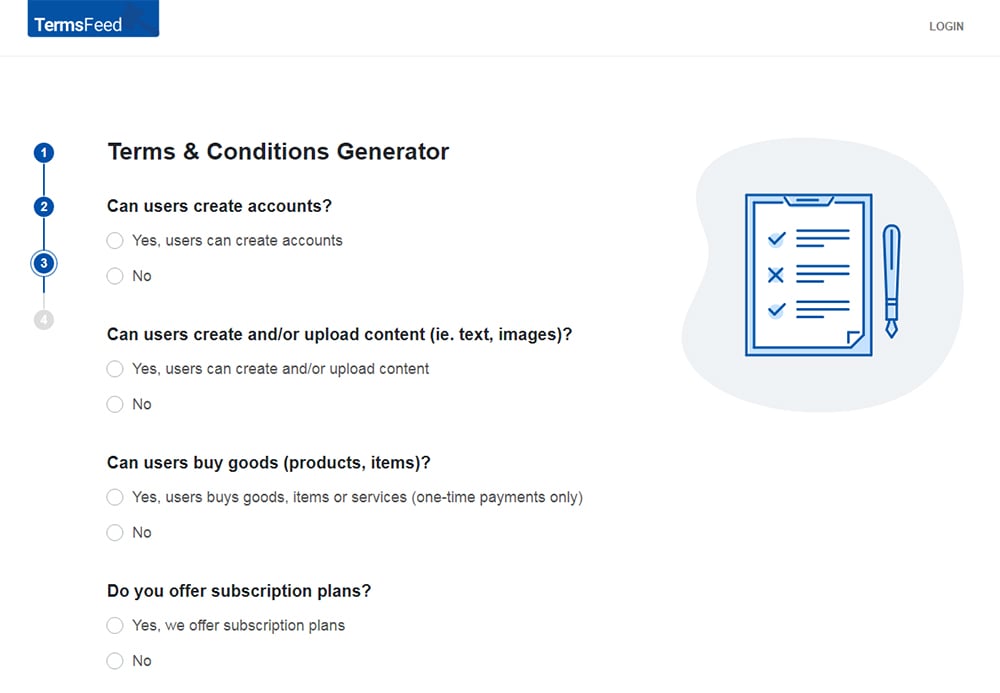
-
Enter the email address where you'd like the T&C delivered and click "Generate."
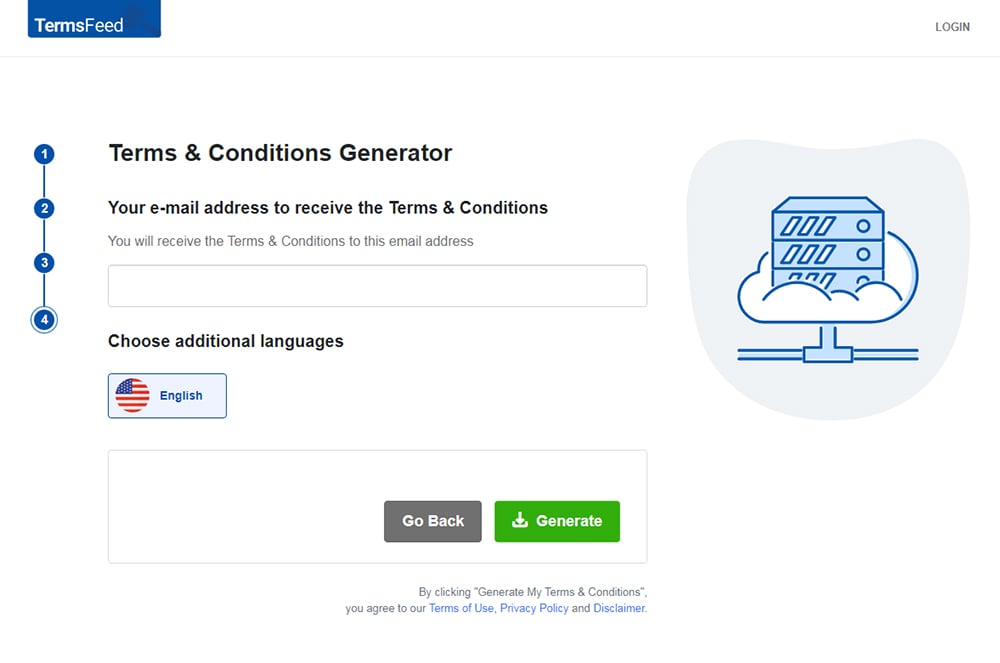
You'll be able to instantly access and download the Terms & Conditions agreement.
Clause 1: Customer rights and responsibilities
Setting out customer's rights and responsibilities is one of the most important clauses in your Terms & Conditions for any e-commerce store, as customers are becoming more educated and more aware of both their rights and the companies they purchase from. If you neglect to add or cover this type of clause, it can depersonalize your store and make it seem less customer friendly.
Here's an example from Flora Tour that takes a clear and concise approach to what their consumers are entitled to, and what the customer must do in return:
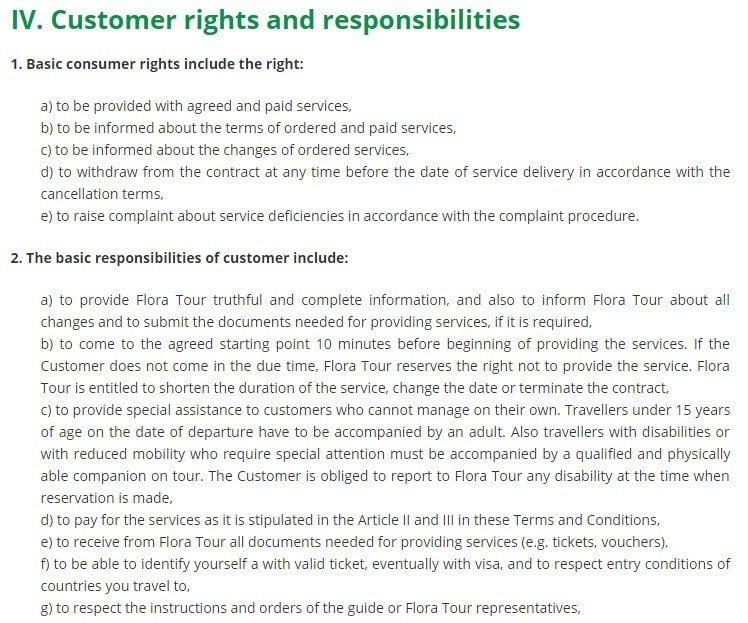
Flora Tour's agreement language is easy to read and a customer can see that the expectations of Flora Tour are reasonable. Flora Tour clearly sets out the basic rights of the customer to be provided with what they paid for and to be informed of any changes to their purchase (in their case, a tour).
This shows respect for the customers and builds trust in the customer relationship with you.
Here's another example from My Own Conference, a seller of webinar software subscriptions:

My Own Conference's example is more focused on customer's responsibilities and takes the tone of an "acceptable use" type of clause.
You can see that My Own Conference clearly state what type of behavior from customers is not acceptable and it also state that the customer is the only authorized user for the account.
This kind of clause can stop most stores and customers from running into issues where multiple people use one account. One person could try to make purchases, and the other person might want those purchases reversed.
Stating clearly in your legal agreement that only one user per account is allowed ensures that, as a business, you can terminate an account if you find out that multiple people are using it.
Consider carefully what kinds of customer's rights and responsibilities you want to cover and what kind of tone you want this section to have and what clauses to add in your Terms and Conditions.
Clause 2: Intellectual property protection
This type of clause - called Intellectual Property - is usually added to protect your store's branding, such as logos, marketing text, photographs of your stock, and web site's design.
It's important to set out what type of intellectual property is covered and what uses of that property are prohibited.
Have a look at this clause from Apple that shows permitted and prohibited uses:
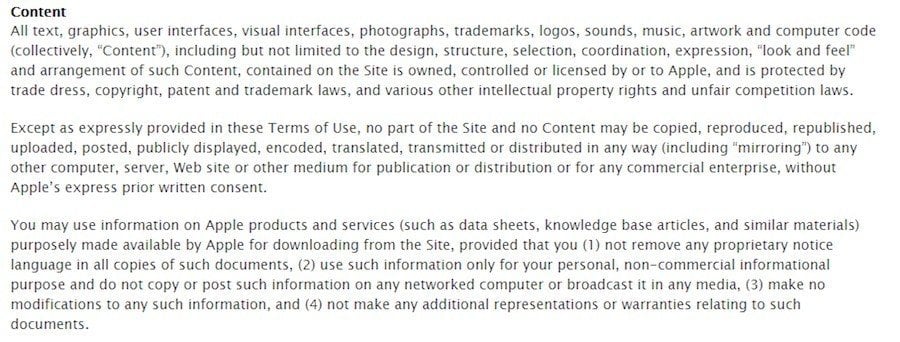
Apple's clause above is fairly standard. Using Apple's example, if a customer or a third party starts to misappropriate your intellectual property by copying it or passing it off as their own, you can terminate that customer's account or take legal action against the third party for breaching your Terms & Conditions agreement.
Clause 3: Payment details and information
It may seem obvious, but you still need to set out information regarding payments in your Terms and Conditions agreement. You should cover what payment methods you allow (such as which credit cards you will accept) and mention what currency the prices on your store are listed in.
This kind of clause ensures that you get a customer's agreement to accept the third party payment processor you use.
In the example from BlackMilk below, you can see that BlackMilk clearly states that payment processing on their website is done through Shopify:
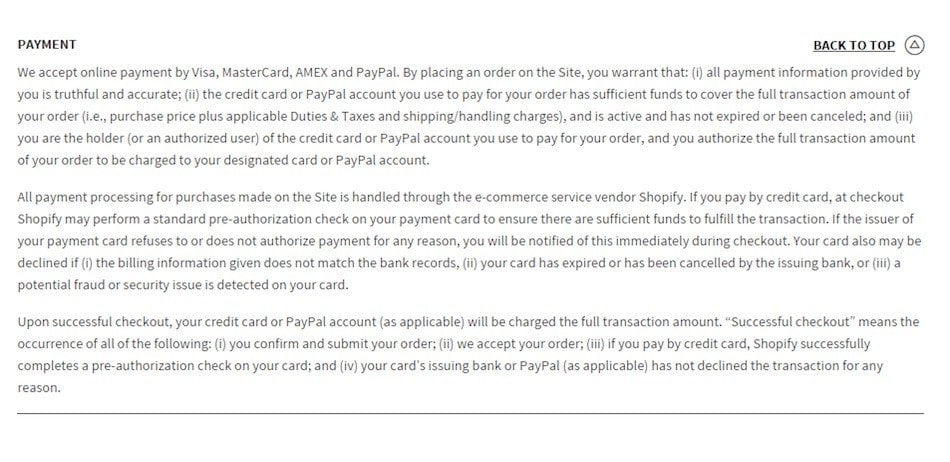
Setting this kind of information in a T&C agreement can prevent certain issues from arising, such as when customers may think that your pricing is in a different currency, or cases when customers reach the checkout and find that your store does not accept their type of credit card.
Covering cases like these in your legal agreement is a good way to have clear expectations between you and your customers. It avoids ambiguity turning into legal issues.
Clause 4: Exclusion and limitation of liability
One of the more heavy-duty clauses that you need to include in a Terms and Conditions agreement is the exclusion or limitation of liability clause.
An exclusion clause does just what it sounds like it excludes all of your liability for certain events or consequences.
In contrast to an exclusion of liability clause, a limitation of liability clause only limits your liability for certain breaches and may explicitly state a dollar amount that the liability is limited to, such as "Store will not be liable for more than $200 in the event of a breach".
Many stores combine their exclusion or limitation of liability clause with their warranty and disclaimers clause, such as in this example from Diesel below:

Courts around the world have held that exclusion clauses are not enforceable unless certain conditions are met. The two key points of these conditions are:
- The clause must be incorporated into the contract
- The liability in question must be covered by the clause
Generally, the clause can be incorporated by signature, by notice, or by the previous course of dealings.
The way that most e-commerce stores would incorporate an exclusion clause is by notice: this means that the person trying to rely on the clause (e.g. the e-commerce store owner) must have taken reasonable steps to bring it to the customer's notice.
You can see in the example above that Diesel has written their clause in all capital letters. That's a popular way that most e-commerce stores try to highlight their exclusion clauses in their agreements.
You also need to ensure that you state the types of liability or damage you want to exclude. If your clause is too vague or unclear, the Courts will not allow it to be binding on your customers.
With regard to the limitation of liability clauses, courts do not look favorably on the limitation of liability clauses that limit liability to an arbitrary, minimal dollar amount. The amount that you limit your liability to must be related to the actual liability amount (for example, if your customer could likely suffer thousands of dollars worth of damage if your product broke, you can't limit your liability to $10).
Here's an example from Bass Pro:

You can see that the dollar amount at the end of the clause is $100. This would likely not be enforceable, as it is not in any way related to the actual loss that a customer could suffer.
Clause 5: Amendment of terms
Your "Terms" page also needs to cover situations where you want to amend your Terms and Conditions.
Most websites use what is called a unilateral amendment clause in their Terms and Conditions agreement. This is when one party (you, the store owner) can make changes without your customers having a say or negotiating anything.
These clauses are enforceable as long as:
- The customer agreed to your Terms & Conditions agreement
- The customer was given reasonable notice of any changes in the agreement
- The customer continues to use your service/shop at your store and you're continuing to perform the service/store
Let's take a look at another example from BlackMilk below.
Note that they state that they will publish an updated version of the "Terms" on their website. This is not enough, as the legal case Roling v. E*Trade held that it's not sufficient to just upload a copy of the new terms to your website.
You must notify your users in some way that the agreement has changed or been updated.

A better way of notifying your users is either with a banner at the top of your store stating that your terms have changed or an email sent to users (assuming you have their permission to email them), such as this notice from Bing Ads:
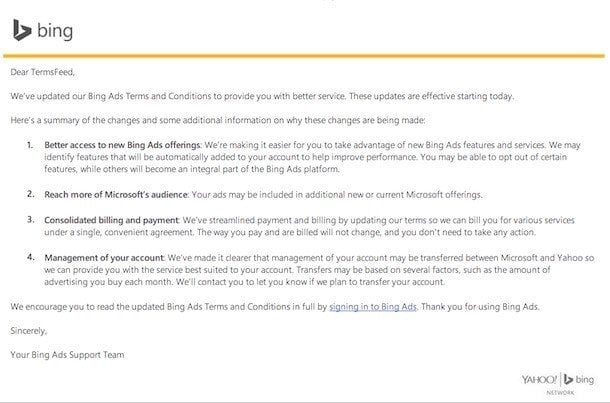
By adding this kind of clause in your store's Terms and Conditions agreement, your store will be more thoroughly legally protected. You'll build customer confidence in the process.

Comprehensive compliance starts with a Privacy Policy.
Comply with the law with our agreements, policies, and consent banners. Everything is included.
